Ibis Hotel: Financial Performance and HR Life Cycle Report
VerifiedAdded on 2022/12/17
|13
|3834
|169
Report
AI Summary
This report provides a comprehensive analysis of the hospitality business, focusing on financial performance, human resource management, and legal compliance. It examines key principles such as inventory management, cash flow statements, and overhead expenses to assess financial health. The report also delves into double-entry bookkeeping, trial balance preparation, and the HR life cycle, including recruitment, training, and performance management. Furthermore, it identifies relevant legislation and explores the impact of organizational policies on business outcomes, using the Ibis Edinburgh Centre Royal Mile hotel as a case study. The report aims to provide insights into effective strategies for managing and optimizing operations within the hospitality sector.
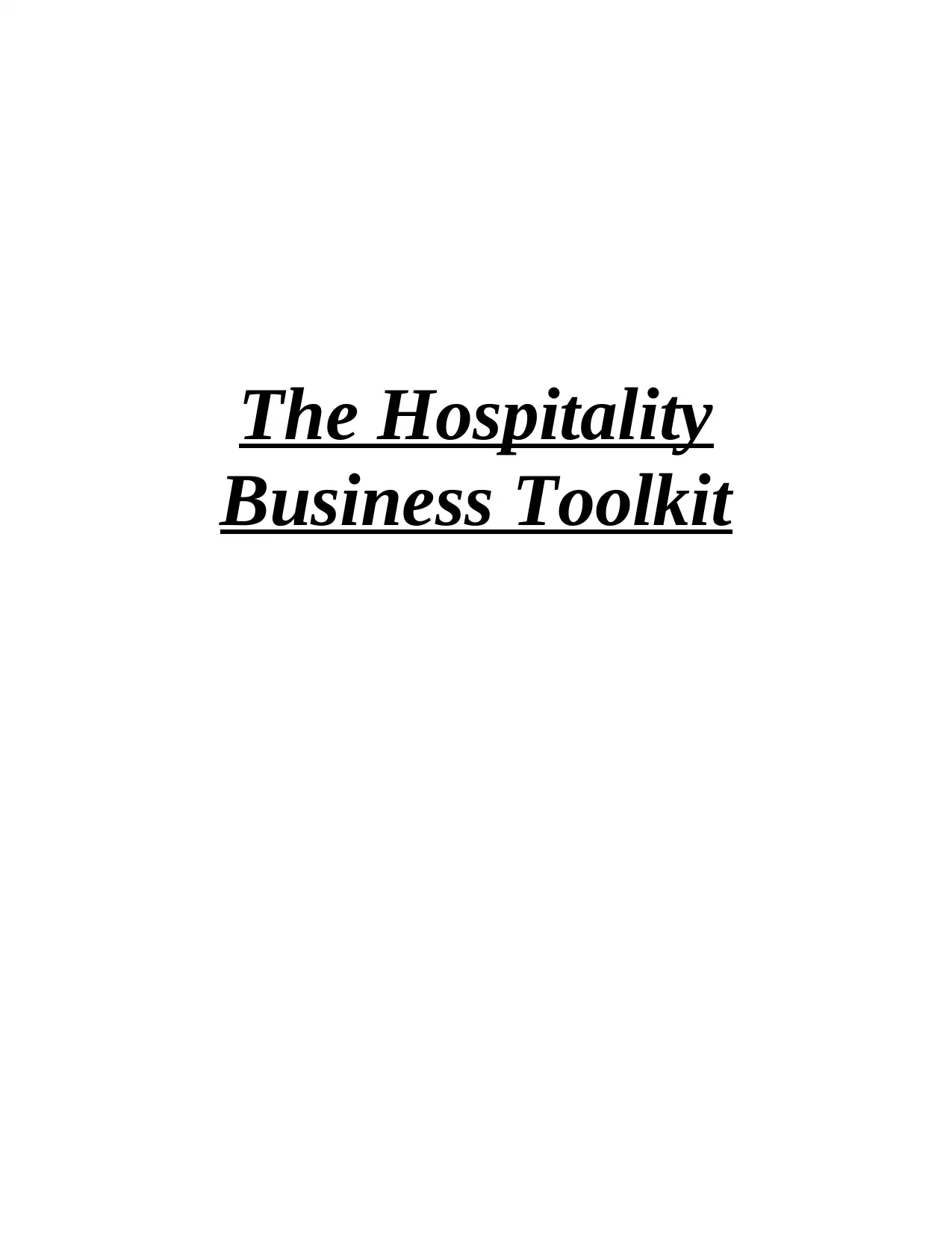
The Hospitality
Business Toolkit
Business Toolkit
Paraphrase This Document
Need a fresh take? Get an instant paraphrase of this document with our AI Paraphraser
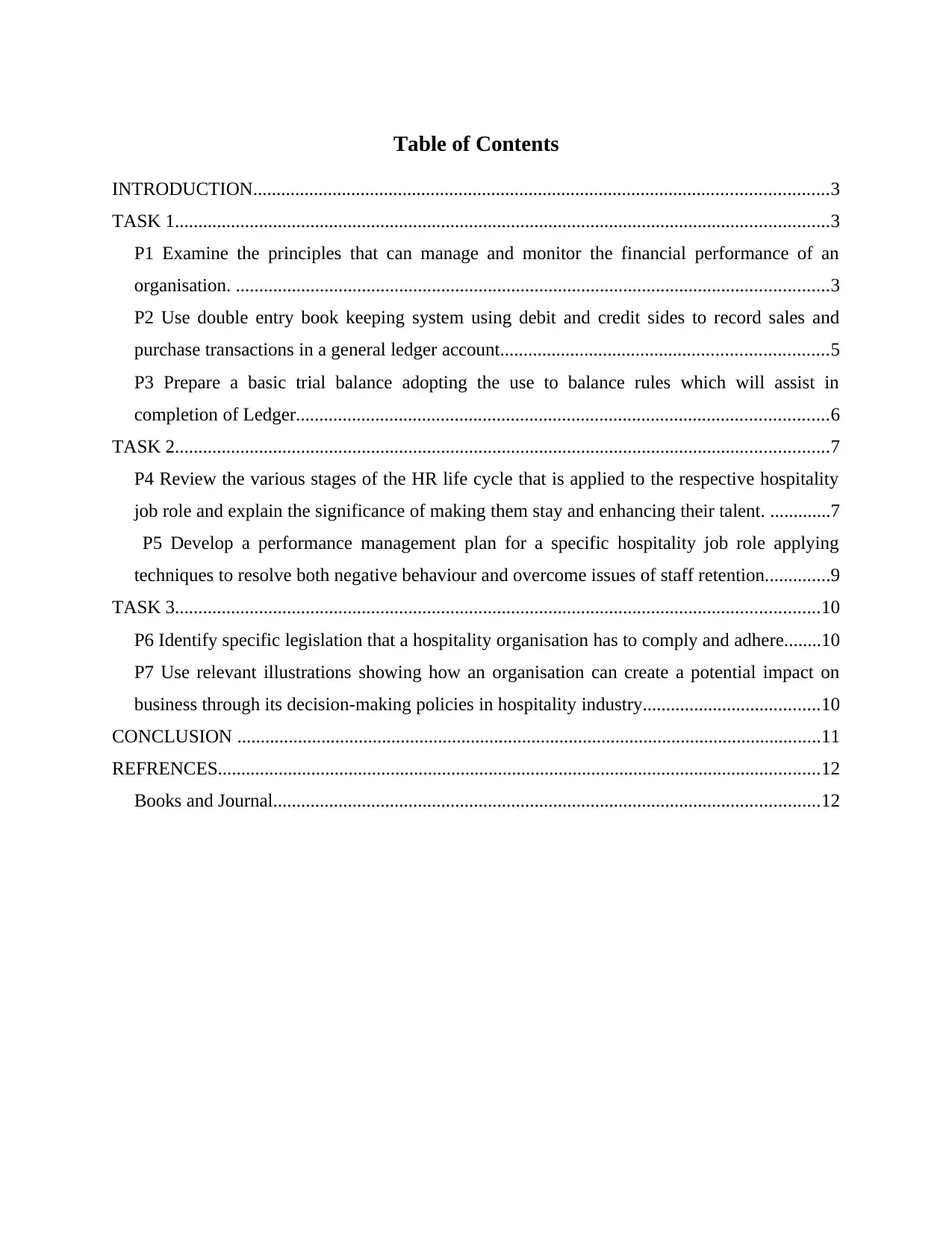
Table of Contents
INTRODUCTION...........................................................................................................................3
TASK 1............................................................................................................................................3
P1 Examine the principles that can manage and monitor the financial performance of an
organisation. ...............................................................................................................................3
P2 Use double entry book keeping system using debit and credit sides to record sales and
purchase transactions in a general ledger account......................................................................5
P3 Prepare a basic trial balance adopting the use to balance rules which will assist in
completion of Ledger..................................................................................................................6
TASK 2............................................................................................................................................7
P4 Review the various stages of the HR life cycle that is applied to the respective hospitality
job role and explain the significance of making them stay and enhancing their talent. .............7
P5 Develop a performance management plan for a specific hospitality job role applying
techniques to resolve both negative behaviour and overcome issues of staff retention..............9
TASK 3..........................................................................................................................................10
P6 Identify specific legislation that a hospitality organisation has to comply and adhere........10
P7 Use relevant illustrations showing how an organisation can create a potential impact on
business through its decision-making policies in hospitality industry......................................10
CONCLUSION .............................................................................................................................11
REFRENCES.................................................................................................................................12
Books and Journal.....................................................................................................................12
INTRODUCTION...........................................................................................................................3
TASK 1............................................................................................................................................3
P1 Examine the principles that can manage and monitor the financial performance of an
organisation. ...............................................................................................................................3
P2 Use double entry book keeping system using debit and credit sides to record sales and
purchase transactions in a general ledger account......................................................................5
P3 Prepare a basic trial balance adopting the use to balance rules which will assist in
completion of Ledger..................................................................................................................6
TASK 2............................................................................................................................................7
P4 Review the various stages of the HR life cycle that is applied to the respective hospitality
job role and explain the significance of making them stay and enhancing their talent. .............7
P5 Develop a performance management plan for a specific hospitality job role applying
techniques to resolve both negative behaviour and overcome issues of staff retention..............9
TASK 3..........................................................................................................................................10
P6 Identify specific legislation that a hospitality organisation has to comply and adhere........10
P7 Use relevant illustrations showing how an organisation can create a potential impact on
business through its decision-making policies in hospitality industry......................................10
CONCLUSION .............................................................................................................................11
REFRENCES.................................................................................................................................12
Books and Journal.....................................................................................................................12
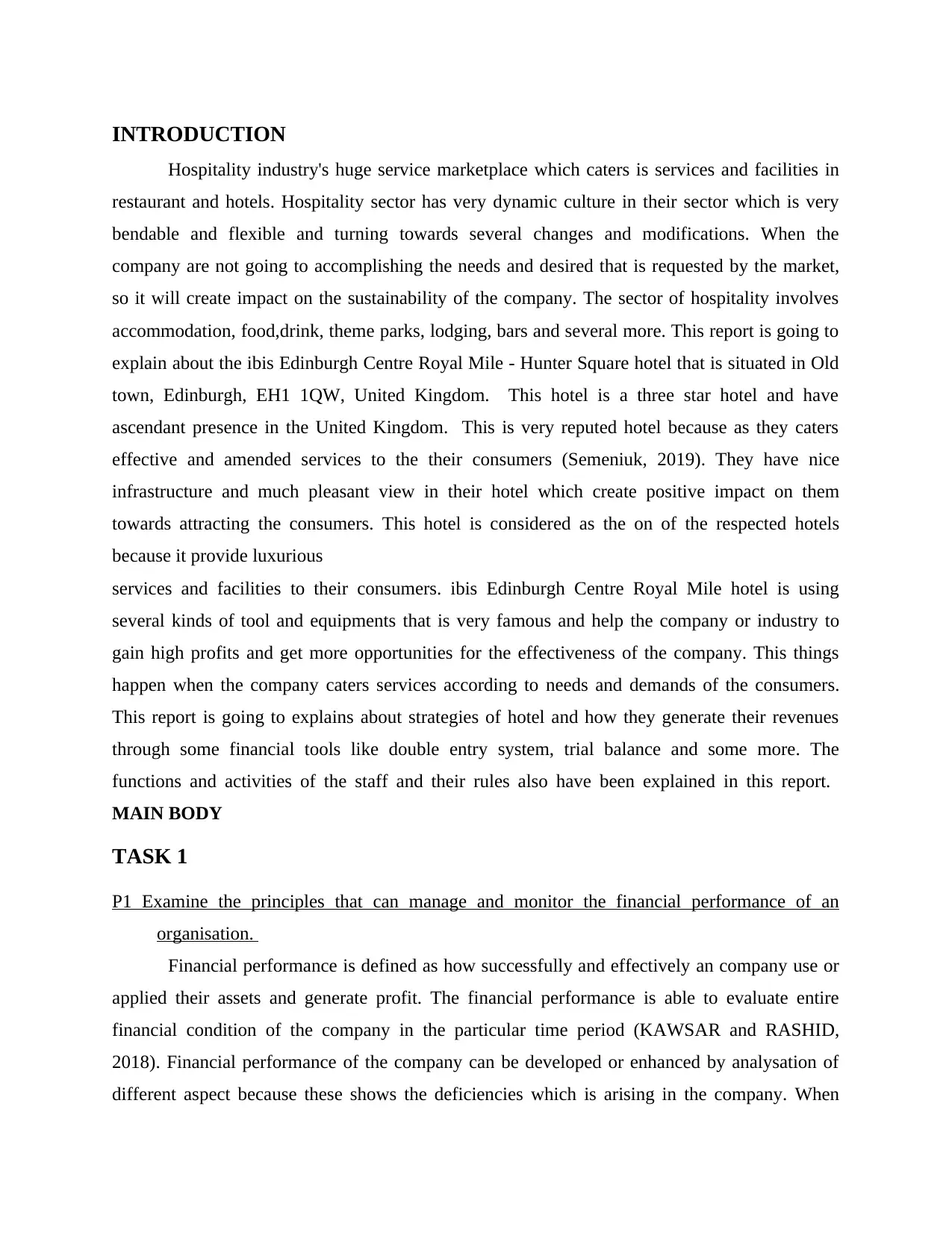
INTRODUCTION
Hospitality industry's huge service marketplace which caters is services and facilities in
restaurant and hotels. Hospitality sector has very dynamic culture in their sector which is very
bendable and flexible and turning towards several changes and modifications. When the
company are not going to accomplishing the needs and desired that is requested by the market,
so it will create impact on the sustainability of the company. The sector of hospitality involves
accommodation, food,drink, theme parks, lodging, bars and several more. This report is going to
explain about the ibis Edinburgh Centre Royal Mile - Hunter Square hotel that is situated in Old
town, Edinburgh, EH1 1QW, United Kingdom. This hotel is a three star hotel and have
ascendant presence in the United Kingdom. This is very reputed hotel because as they caters
effective and amended services to the their consumers (Semeniuk, 2019). They have nice
infrastructure and much pleasant view in their hotel which create positive impact on them
towards attracting the consumers. This hotel is considered as the on of the respected hotels
because it provide luxurious
services and facilities to their consumers. ibis Edinburgh Centre Royal Mile hotel is using
several kinds of tool and equipments that is very famous and help the company or industry to
gain high profits and get more opportunities for the effectiveness of the company. This things
happen when the company caters services according to needs and demands of the consumers.
This report is going to explains about strategies of hotel and how they generate their revenues
through some financial tools like double entry system, trial balance and some more. The
functions and activities of the staff and their rules also have been explained in this report.
MAIN BODY
TASK 1
P1 Examine the principles that can manage and monitor the financial performance of an
organisation.
Financial performance is defined as how successfully and effectively an company use or
applied their assets and generate profit. The financial performance is able to evaluate entire
financial condition of the company in the particular time period (KAWSAR and RASHID,
2018). Financial performance of the company can be developed or enhanced by analysation of
different aspect because these shows the deficiencies which is arising in the company. When
Hospitality industry's huge service marketplace which caters is services and facilities in
restaurant and hotels. Hospitality sector has very dynamic culture in their sector which is very
bendable and flexible and turning towards several changes and modifications. When the
company are not going to accomplishing the needs and desired that is requested by the market,
so it will create impact on the sustainability of the company. The sector of hospitality involves
accommodation, food,drink, theme parks, lodging, bars and several more. This report is going to
explain about the ibis Edinburgh Centre Royal Mile - Hunter Square hotel that is situated in Old
town, Edinburgh, EH1 1QW, United Kingdom. This hotel is a three star hotel and have
ascendant presence in the United Kingdom. This is very reputed hotel because as they caters
effective and amended services to the their consumers (Semeniuk, 2019). They have nice
infrastructure and much pleasant view in their hotel which create positive impact on them
towards attracting the consumers. This hotel is considered as the on of the respected hotels
because it provide luxurious
services and facilities to their consumers. ibis Edinburgh Centre Royal Mile hotel is using
several kinds of tool and equipments that is very famous and help the company or industry to
gain high profits and get more opportunities for the effectiveness of the company. This things
happen when the company caters services according to needs and demands of the consumers.
This report is going to explains about strategies of hotel and how they generate their revenues
through some financial tools like double entry system, trial balance and some more. The
functions and activities of the staff and their rules also have been explained in this report.
MAIN BODY
TASK 1
P1 Examine the principles that can manage and monitor the financial performance of an
organisation.
Financial performance is defined as how successfully and effectively an company use or
applied their assets and generate profit. The financial performance is able to evaluate entire
financial condition of the company in the particular time period (KAWSAR and RASHID,
2018). Financial performance of the company can be developed or enhanced by analysation of
different aspect because these shows the deficiencies which is arising in the company. When
⊘ This is a preview!⊘
Do you want full access?
Subscribe today to unlock all pages.

Trusted by 1+ million students worldwide
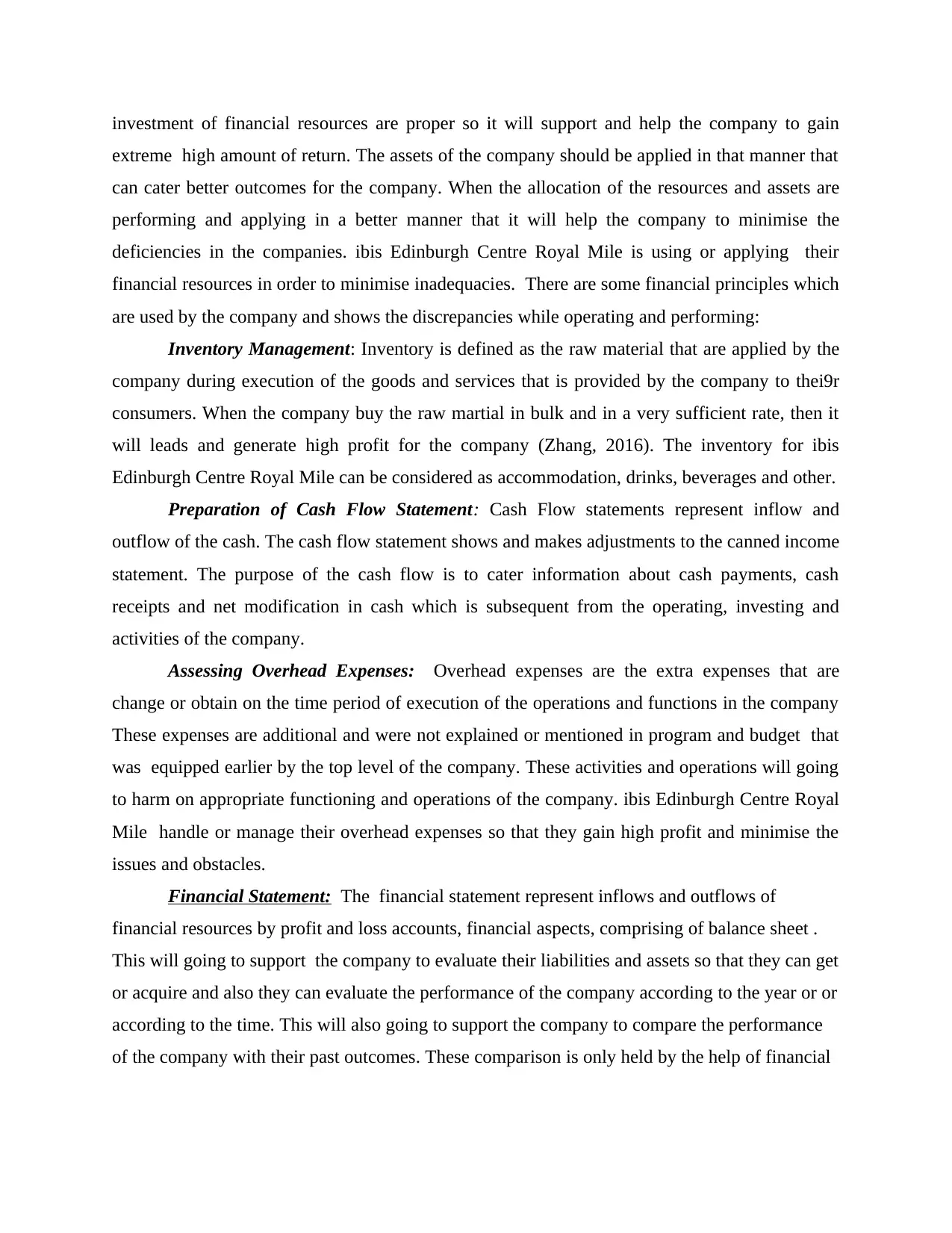
investment of financial resources are proper so it will support and help the company to gain
extreme high amount of return. The assets of the company should be applied in that manner that
can cater better outcomes for the company. When the allocation of the resources and assets are
performing and applying in a better manner that it will help the company to minimise the
deficiencies in the companies. ibis Edinburgh Centre Royal Mile is using or applying their
financial resources in order to minimise inadequacies. There are some financial principles which
are used by the company and shows the discrepancies while operating and performing:
Inventory Management: Inventory is defined as the raw material that are applied by the
company during execution of the goods and services that is provided by the company to thei9r
consumers. When the company buy the raw martial in bulk and in a very sufficient rate, then it
will leads and generate high profit for the company (Zhang, 2016). The inventory for ibis
Edinburgh Centre Royal Mile can be considered as accommodation, drinks, beverages and other.
Preparation of Cash Flow Statement: Cash Flow statements represent inflow and
outflow of the cash. The cash flow statement shows and makes adjustments to the canned income
statement. The purpose of the cash flow is to cater information about cash payments, cash
receipts and net modification in cash which is subsequent from the operating, investing and
activities of the company.
Assessing Overhead Expenses: Overhead expenses are the extra expenses that are
change or obtain on the time period of execution of the operations and functions in the company
These expenses are additional and were not explained or mentioned in program and budget that
was equipped earlier by the top level of the company. These activities and operations will going
to harm on appropriate functioning and operations of the company. ibis Edinburgh Centre Royal
Mile handle or manage their overhead expenses so that they gain high profit and minimise the
issues and obstacles.
Financial Statement: The financial statement represent inflows and outflows of
financial resources by profit and loss accounts, financial aspects, comprising of balance sheet .
This will going to support the company to evaluate their liabilities and assets so that they can get
or acquire and also they can evaluate the performance of the company according to the year or or
according to the time. This will also going to support the company to compare the performance
of the company with their past outcomes. These comparison is only held by the help of financial
extreme high amount of return. The assets of the company should be applied in that manner that
can cater better outcomes for the company. When the allocation of the resources and assets are
performing and applying in a better manner that it will help the company to minimise the
deficiencies in the companies. ibis Edinburgh Centre Royal Mile is using or applying their
financial resources in order to minimise inadequacies. There are some financial principles which
are used by the company and shows the discrepancies while operating and performing:
Inventory Management: Inventory is defined as the raw material that are applied by the
company during execution of the goods and services that is provided by the company to thei9r
consumers. When the company buy the raw martial in bulk and in a very sufficient rate, then it
will leads and generate high profit for the company (Zhang, 2016). The inventory for ibis
Edinburgh Centre Royal Mile can be considered as accommodation, drinks, beverages and other.
Preparation of Cash Flow Statement: Cash Flow statements represent inflow and
outflow of the cash. The cash flow statement shows and makes adjustments to the canned income
statement. The purpose of the cash flow is to cater information about cash payments, cash
receipts and net modification in cash which is subsequent from the operating, investing and
activities of the company.
Assessing Overhead Expenses: Overhead expenses are the extra expenses that are
change or obtain on the time period of execution of the operations and functions in the company
These expenses are additional and were not explained or mentioned in program and budget that
was equipped earlier by the top level of the company. These activities and operations will going
to harm on appropriate functioning and operations of the company. ibis Edinburgh Centre Royal
Mile handle or manage their overhead expenses so that they gain high profit and minimise the
issues and obstacles.
Financial Statement: The financial statement represent inflows and outflows of
financial resources by profit and loss accounts, financial aspects, comprising of balance sheet .
This will going to support the company to evaluate their liabilities and assets so that they can get
or acquire and also they can evaluate the performance of the company according to the year or or
according to the time. This will also going to support the company to compare the performance
of the company with their past outcomes. These comparison is only held by the help of financial
Paraphrase This Document
Need a fresh take? Get an instant paraphrase of this document with our AI Paraphraser
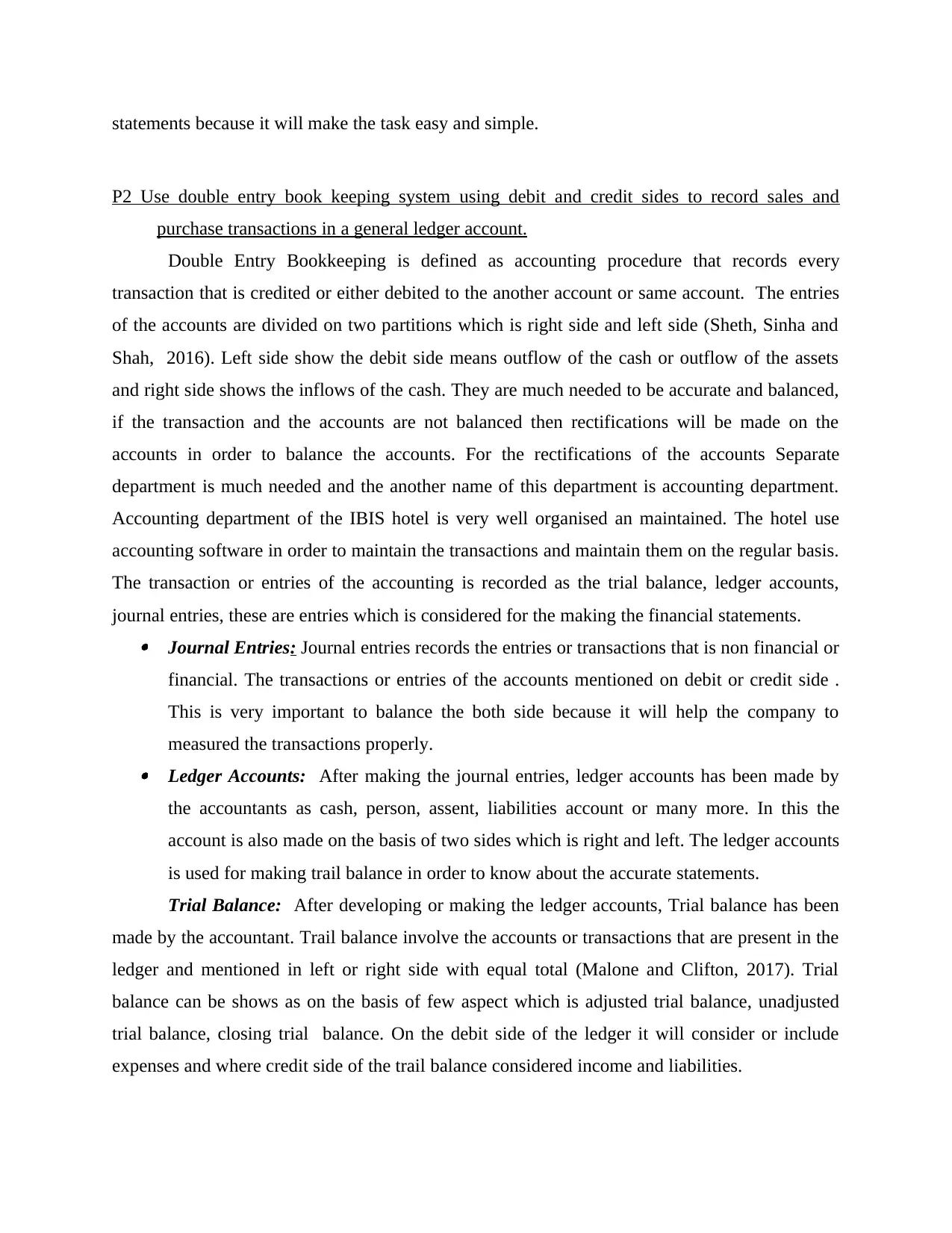
statements because it will make the task easy and simple.
P2 Use double entry book keeping system using debit and credit sides to record sales and
purchase transactions in a general ledger account.
Double Entry Bookkeeping is defined as accounting procedure that records every
transaction that is credited or either debited to the another account or same account. The entries
of the accounts are divided on two partitions which is right side and left side (Sheth, Sinha and
Shah, 2016). Left side show the debit side means outflow of the cash or outflow of the assets
and right side shows the inflows of the cash. They are much needed to be accurate and balanced,
if the transaction and the accounts are not balanced then rectifications will be made on the
accounts in order to balance the accounts. For the rectifications of the accounts Separate
department is much needed and the another name of this department is accounting department.
Accounting department of the IBIS hotel is very well organised an maintained. The hotel use
accounting software in order to maintain the transactions and maintain them on the regular basis.
The transaction or entries of the accounting is recorded as the trial balance, ledger accounts,
journal entries, these are entries which is considered for the making the financial statements. Journal Entries: Journal entries records the entries or transactions that is non financial or
financial. The transactions or entries of the accounts mentioned on debit or credit side .
This is very important to balance the both side because it will help the company to
measured the transactions properly. Ledger Accounts: After making the journal entries, ledger accounts has been made by
the accountants as cash, person, assent, liabilities account or many more. In this the
account is also made on the basis of two sides which is right and left. The ledger accounts
is used for making trail balance in order to know about the accurate statements.
Trial Balance: After developing or making the ledger accounts, Trial balance has been
made by the accountant. Trail balance involve the accounts or transactions that are present in the
ledger and mentioned in left or right side with equal total (Malone and Clifton, 2017). Trial
balance can be shows as on the basis of few aspect which is adjusted trial balance, unadjusted
trial balance, closing trial balance. On the debit side of the ledger it will consider or include
expenses and where credit side of the trail balance considered income and liabilities.
P2 Use double entry book keeping system using debit and credit sides to record sales and
purchase transactions in a general ledger account.
Double Entry Bookkeeping is defined as accounting procedure that records every
transaction that is credited or either debited to the another account or same account. The entries
of the accounts are divided on two partitions which is right side and left side (Sheth, Sinha and
Shah, 2016). Left side show the debit side means outflow of the cash or outflow of the assets
and right side shows the inflows of the cash. They are much needed to be accurate and balanced,
if the transaction and the accounts are not balanced then rectifications will be made on the
accounts in order to balance the accounts. For the rectifications of the accounts Separate
department is much needed and the another name of this department is accounting department.
Accounting department of the IBIS hotel is very well organised an maintained. The hotel use
accounting software in order to maintain the transactions and maintain them on the regular basis.
The transaction or entries of the accounting is recorded as the trial balance, ledger accounts,
journal entries, these are entries which is considered for the making the financial statements. Journal Entries: Journal entries records the entries or transactions that is non financial or
financial. The transactions or entries of the accounts mentioned on debit or credit side .
This is very important to balance the both side because it will help the company to
measured the transactions properly. Ledger Accounts: After making the journal entries, ledger accounts has been made by
the accountants as cash, person, assent, liabilities account or many more. In this the
account is also made on the basis of two sides which is right and left. The ledger accounts
is used for making trail balance in order to know about the accurate statements.
Trial Balance: After developing or making the ledger accounts, Trial balance has been
made by the accountant. Trail balance involve the accounts or transactions that are present in the
ledger and mentioned in left or right side with equal total (Malone and Clifton, 2017). Trial
balance can be shows as on the basis of few aspect which is adjusted trial balance, unadjusted
trial balance, closing trial balance. On the debit side of the ledger it will consider or include
expenses and where credit side of the trail balance considered income and liabilities.
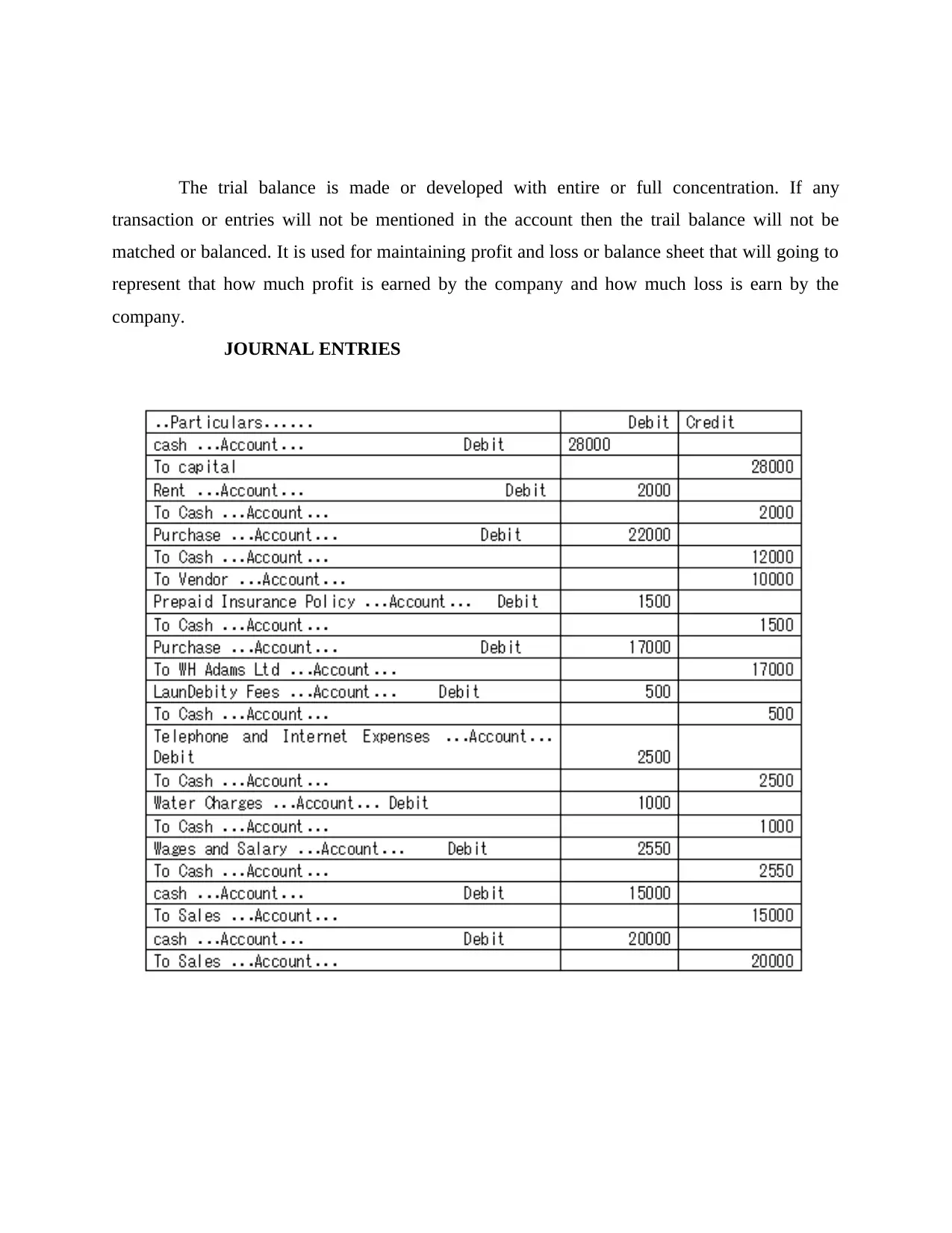
The trial balance is made or developed with entire or full concentration. If any
transaction or entries will not be mentioned in the account then the trail balance will not be
matched or balanced. It is used for maintaining profit and loss or balance sheet that will going to
represent that how much profit is earned by the company and how much loss is earn by the
company.
JOURNAL ENTRIES
transaction or entries will not be mentioned in the account then the trail balance will not be
matched or balanced. It is used for maintaining profit and loss or balance sheet that will going to
represent that how much profit is earned by the company and how much loss is earn by the
company.
JOURNAL ENTRIES
⊘ This is a preview!⊘
Do you want full access?
Subscribe today to unlock all pages.

Trusted by 1+ million students worldwide
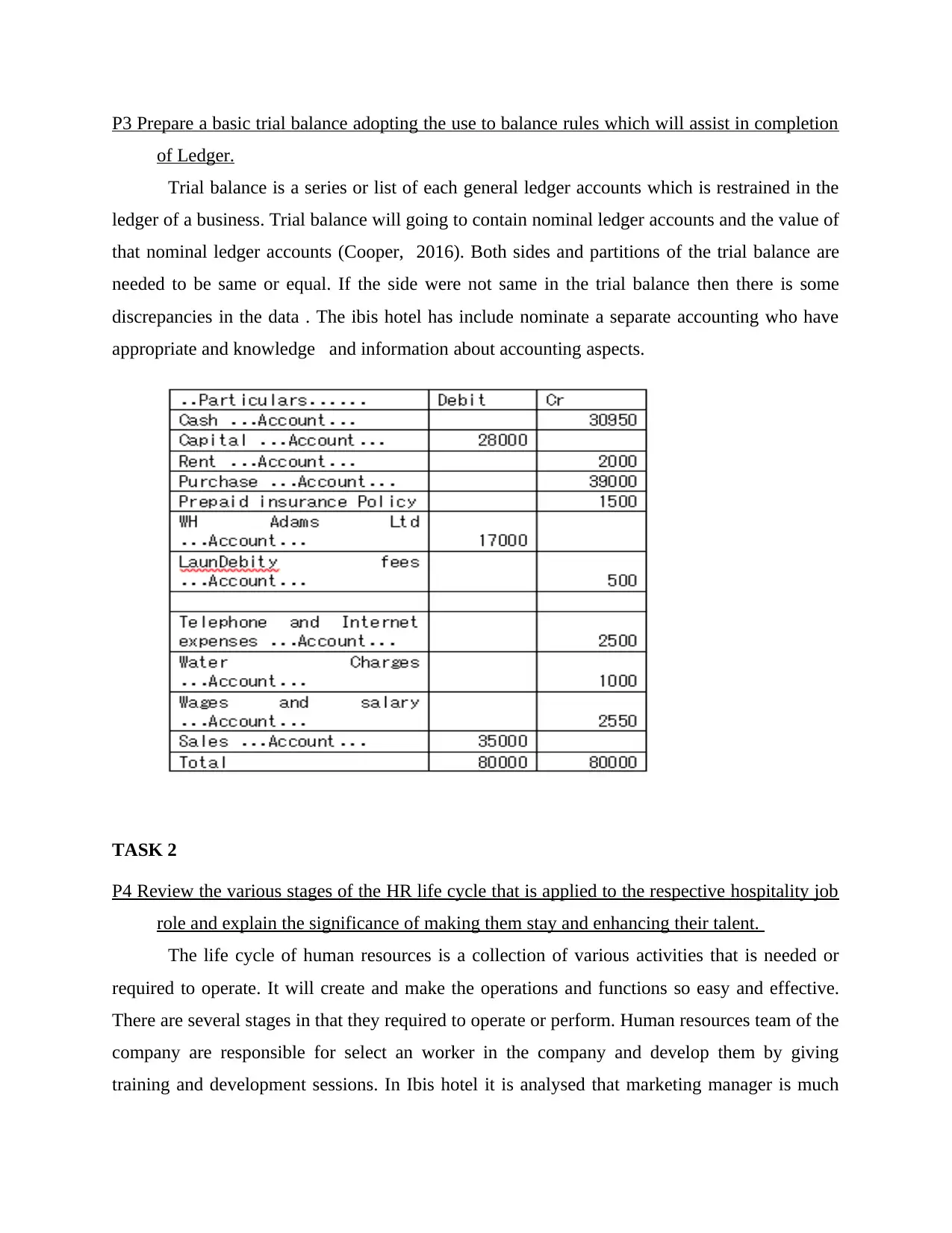
P3 Prepare a basic trial balance adopting the use to balance rules which will assist in completion
of Ledger.
Trial balance is a series or list of each general ledger accounts which is restrained in the
ledger of a business. Trial balance will going to contain nominal ledger accounts and the value of
that nominal ledger accounts (Cooper, 2016). Both sides and partitions of the trial balance are
needed to be same or equal. If the side were not same in the trial balance then there is some
discrepancies in the data . The ibis hotel has include nominate a separate accounting who have
appropriate and knowledge and information about accounting aspects.
TASK 2
P4 Review the various stages of the HR life cycle that is applied to the respective hospitality job
role and explain the significance of making them stay and enhancing their talent.
The life cycle of human resources is a collection of various activities that is needed or
required to operate. It will create and make the operations and functions so easy and effective.
There are several stages in that they required to operate or perform. Human resources team of the
company are responsible for select an worker in the company and develop them by giving
training and development sessions. In Ibis hotel it is analysed that marketing manager is much
of Ledger.
Trial balance is a series or list of each general ledger accounts which is restrained in the
ledger of a business. Trial balance will going to contain nominal ledger accounts and the value of
that nominal ledger accounts (Cooper, 2016). Both sides and partitions of the trial balance are
needed to be same or equal. If the side were not same in the trial balance then there is some
discrepancies in the data . The ibis hotel has include nominate a separate accounting who have
appropriate and knowledge and information about accounting aspects.
TASK 2
P4 Review the various stages of the HR life cycle that is applied to the respective hospitality job
role and explain the significance of making them stay and enhancing their talent.
The life cycle of human resources is a collection of various activities that is needed or
required to operate. It will create and make the operations and functions so easy and effective.
There are several stages in that they required to operate or perform. Human resources team of the
company are responsible for select an worker in the company and develop them by giving
training and development sessions. In Ibis hotel it is analysed that marketing manager is much
Paraphrase This Document
Need a fresh take? Get an instant paraphrase of this document with our AI Paraphraser
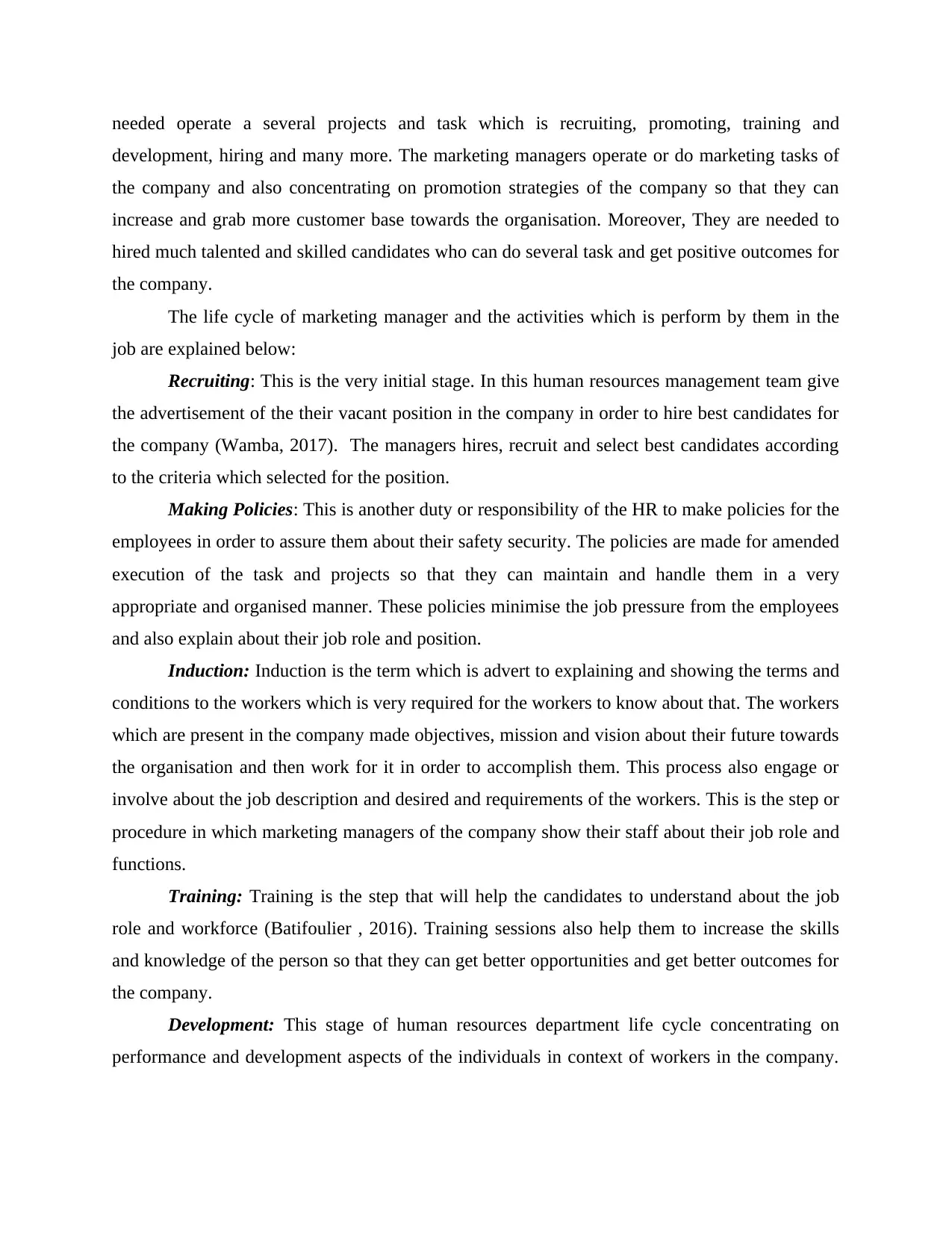
needed operate a several projects and task which is recruiting, promoting, training and
development, hiring and many more. The marketing managers operate or do marketing tasks of
the company and also concentrating on promotion strategies of the company so that they can
increase and grab more customer base towards the organisation. Moreover, They are needed to
hired much talented and skilled candidates who can do several task and get positive outcomes for
the company.
The life cycle of marketing manager and the activities which is perform by them in the
job are explained below:
Recruiting: This is the very initial stage. In this human resources management team give
the advertisement of the their vacant position in the company in order to hire best candidates for
the company (Wamba, 2017). The managers hires, recruit and select best candidates according
to the criteria which selected for the position.
Making Policies: This is another duty or responsibility of the HR to make policies for the
employees in order to assure them about their safety security. The policies are made for amended
execution of the task and projects so that they can maintain and handle them in a very
appropriate and organised manner. These policies minimise the job pressure from the employees
and also explain about their job role and position.
Induction: Induction is the term which is advert to explaining and showing the terms and
conditions to the workers which is very required for the workers to know about that. The workers
which are present in the company made objectives, mission and vision about their future towards
the organisation and then work for it in order to accomplish them. This process also engage or
involve about the job description and desired and requirements of the workers. This is the step or
procedure in which marketing managers of the company show their staff about their job role and
functions.
Training: Training is the step that will help the candidates to understand about the job
role and workforce (Batifoulier , 2016). Training sessions also help them to increase the skills
and knowledge of the person so that they can get better opportunities and get better outcomes for
the company.
Development: This stage of human resources department life cycle concentrating on
performance and development aspects of the individuals in context of workers in the company.
development, hiring and many more. The marketing managers operate or do marketing tasks of
the company and also concentrating on promotion strategies of the company so that they can
increase and grab more customer base towards the organisation. Moreover, They are needed to
hired much talented and skilled candidates who can do several task and get positive outcomes for
the company.
The life cycle of marketing manager and the activities which is perform by them in the
job are explained below:
Recruiting: This is the very initial stage. In this human resources management team give
the advertisement of the their vacant position in the company in order to hire best candidates for
the company (Wamba, 2017). The managers hires, recruit and select best candidates according
to the criteria which selected for the position.
Making Policies: This is another duty or responsibility of the HR to make policies for the
employees in order to assure them about their safety security. The policies are made for amended
execution of the task and projects so that they can maintain and handle them in a very
appropriate and organised manner. These policies minimise the job pressure from the employees
and also explain about their job role and position.
Induction: Induction is the term which is advert to explaining and showing the terms and
conditions to the workers which is very required for the workers to know about that. The workers
which are present in the company made objectives, mission and vision about their future towards
the organisation and then work for it in order to accomplish them. This process also engage or
involve about the job description and desired and requirements of the workers. This is the step or
procedure in which marketing managers of the company show their staff about their job role and
functions.
Training: Training is the step that will help the candidates to understand about the job
role and workforce (Batifoulier , 2016). Training sessions also help them to increase the skills
and knowledge of the person so that they can get better opportunities and get better outcomes for
the company.
Development: This stage of human resources department life cycle concentrating on
performance and development aspects of the individuals in context of workers in the company.
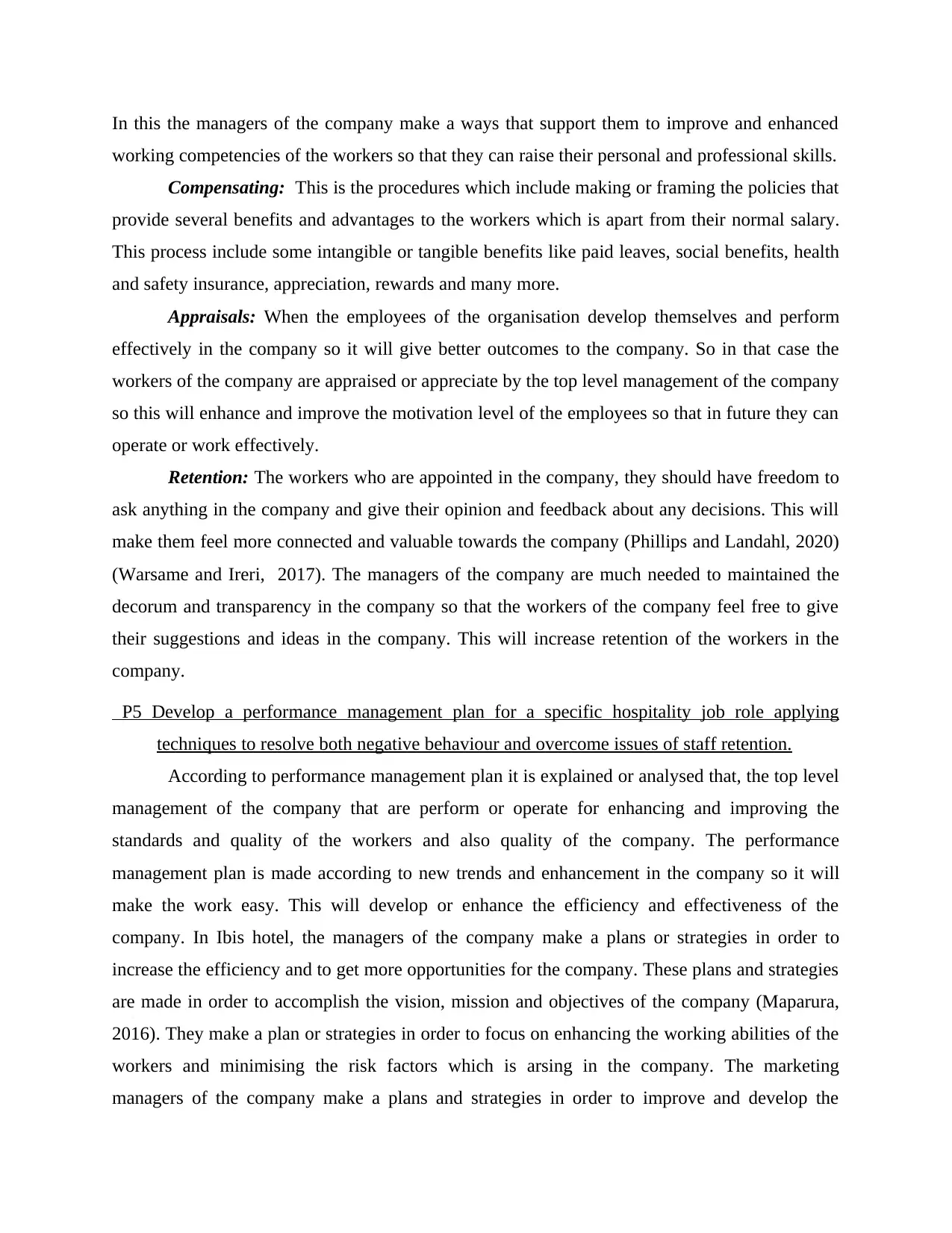
In this the managers of the company make a ways that support them to improve and enhanced
working competencies of the workers so that they can raise their personal and professional skills.
Compensating: This is the procedures which include making or framing the policies that
provide several benefits and advantages to the workers which is apart from their normal salary.
This process include some intangible or tangible benefits like paid leaves, social benefits, health
and safety insurance, appreciation, rewards and many more.
Appraisals: When the employees of the organisation develop themselves and perform
effectively in the company so it will give better outcomes to the company. So in that case the
workers of the company are appraised or appreciate by the top level management of the company
so this will enhance and improve the motivation level of the employees so that in future they can
operate or work effectively.
Retention: The workers who are appointed in the company, they should have freedom to
ask anything in the company and give their opinion and feedback about any decisions. This will
make them feel more connected and valuable towards the company (Phillips and Landahl, 2020)
(Warsame and Ireri, 2017). The managers of the company are much needed to maintained the
decorum and transparency in the company so that the workers of the company feel free to give
their suggestions and ideas in the company. This will increase retention of the workers in the
company.
P5 Develop a performance management plan for a specific hospitality job role applying
techniques to resolve both negative behaviour and overcome issues of staff retention.
According to performance management plan it is explained or analysed that, the top level
management of the company that are perform or operate for enhancing and improving the
standards and quality of the workers and also quality of the company. The performance
management plan is made according to new trends and enhancement in the company so it will
make the work easy. This will develop or enhance the efficiency and effectiveness of the
company. In Ibis hotel, the managers of the company make a plans or strategies in order to
increase the efficiency and to get more opportunities for the company. These plans and strategies
are made in order to accomplish the vision, mission and objectives of the company (Maparura,
2016). They make a plan or strategies in order to focus on enhancing the working abilities of the
workers and minimising the risk factors which is arsing in the company. The marketing
managers of the company make a plans and strategies in order to improve and develop the
working competencies of the workers so that they can raise their personal and professional skills.
Compensating: This is the procedures which include making or framing the policies that
provide several benefits and advantages to the workers which is apart from their normal salary.
This process include some intangible or tangible benefits like paid leaves, social benefits, health
and safety insurance, appreciation, rewards and many more.
Appraisals: When the employees of the organisation develop themselves and perform
effectively in the company so it will give better outcomes to the company. So in that case the
workers of the company are appraised or appreciate by the top level management of the company
so this will enhance and improve the motivation level of the employees so that in future they can
operate or work effectively.
Retention: The workers who are appointed in the company, they should have freedom to
ask anything in the company and give their opinion and feedback about any decisions. This will
make them feel more connected and valuable towards the company (Phillips and Landahl, 2020)
(Warsame and Ireri, 2017). The managers of the company are much needed to maintained the
decorum and transparency in the company so that the workers of the company feel free to give
their suggestions and ideas in the company. This will increase retention of the workers in the
company.
P5 Develop a performance management plan for a specific hospitality job role applying
techniques to resolve both negative behaviour and overcome issues of staff retention.
According to performance management plan it is explained or analysed that, the top level
management of the company that are perform or operate for enhancing and improving the
standards and quality of the workers and also quality of the company. The performance
management plan is made according to new trends and enhancement in the company so it will
make the work easy. This will develop or enhance the efficiency and effectiveness of the
company. In Ibis hotel, the managers of the company make a plans or strategies in order to
increase the efficiency and to get more opportunities for the company. These plans and strategies
are made in order to accomplish the vision, mission and objectives of the company (Maparura,
2016). They make a plan or strategies in order to focus on enhancing the working abilities of the
workers and minimising the risk factors which is arsing in the company. The marketing
managers of the company make a plans and strategies in order to improve and develop the
⊘ This is a preview!⊘
Do you want full access?
Subscribe today to unlock all pages.

Trusted by 1+ million students worldwide
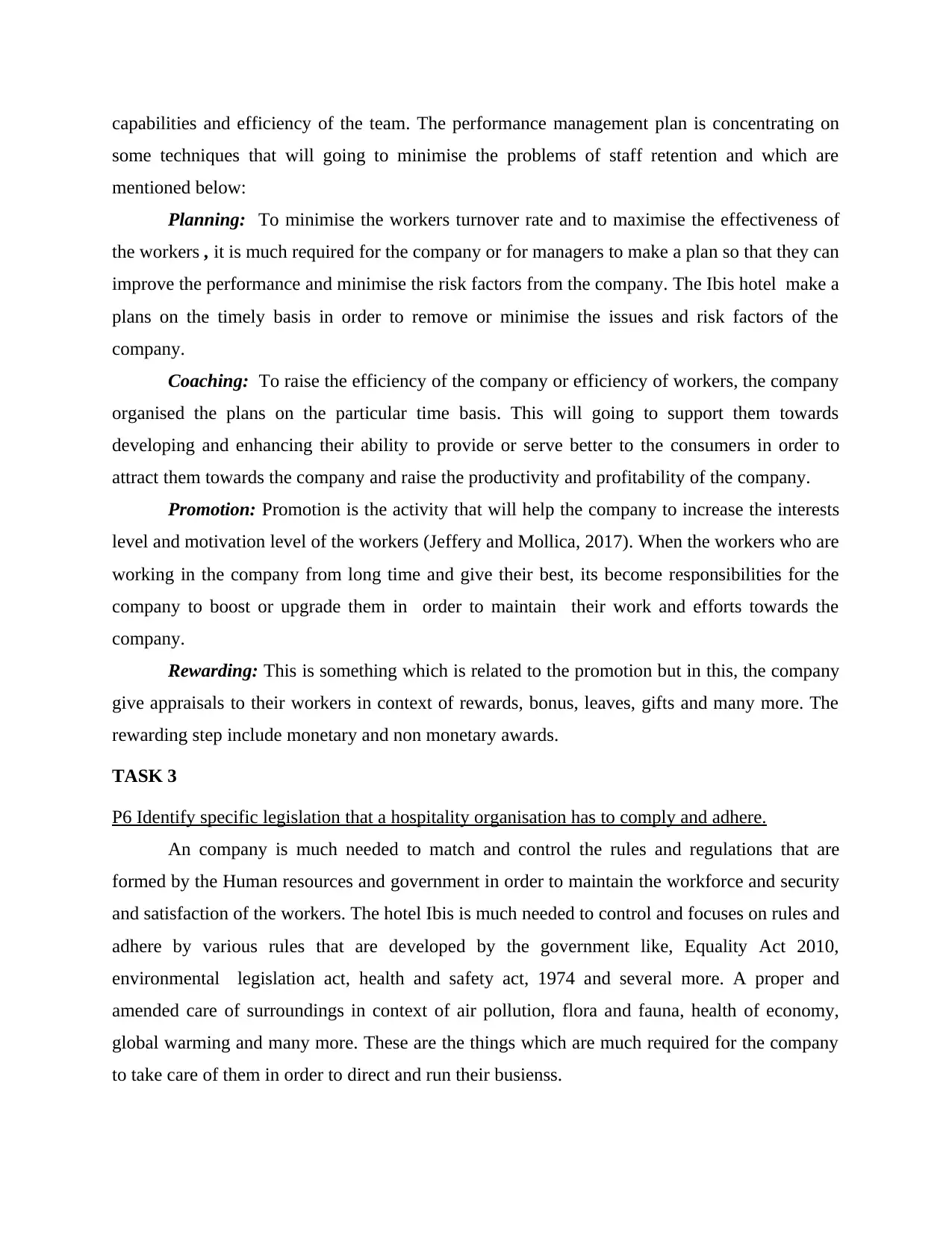
capabilities and efficiency of the team. The performance management plan is concentrating on
some techniques that will going to minimise the problems of staff retention and which are
mentioned below:
Planning: To minimise the workers turnover rate and to maximise the effectiveness of
the workers , it is much required for the company or for managers to make a plan so that they can
improve the performance and minimise the risk factors from the company. The Ibis hotel make a
plans on the timely basis in order to remove or minimise the issues and risk factors of the
company.
Coaching: To raise the efficiency of the company or efficiency of workers, the company
organised the plans on the particular time basis. This will going to support them towards
developing and enhancing their ability to provide or serve better to the consumers in order to
attract them towards the company and raise the productivity and profitability of the company.
Promotion: Promotion is the activity that will help the company to increase the interests
level and motivation level of the workers (Jeffery and Mollica, 2017). When the workers who are
working in the company from long time and give their best, its become responsibilities for the
company to boost or upgrade them in order to maintain their work and efforts towards the
company.
Rewarding: This is something which is related to the promotion but in this, the company
give appraisals to their workers in context of rewards, bonus, leaves, gifts and many more. The
rewarding step include monetary and non monetary awards.
TASK 3
P6 Identify specific legislation that a hospitality organisation has to comply and adhere.
An company is much needed to match and control the rules and regulations that are
formed by the Human resources and government in order to maintain the workforce and security
and satisfaction of the workers. The hotel Ibis is much needed to control and focuses on rules and
adhere by various rules that are developed by the government like, Equality Act 2010,
environmental legislation act, health and safety act, 1974 and several more. A proper and
amended care of surroundings in context of air pollution, flora and fauna, health of economy,
global warming and many more. These are the things which are much required for the company
to take care of them in order to direct and run their busienss.
some techniques that will going to minimise the problems of staff retention and which are
mentioned below:
Planning: To minimise the workers turnover rate and to maximise the effectiveness of
the workers , it is much required for the company or for managers to make a plan so that they can
improve the performance and minimise the risk factors from the company. The Ibis hotel make a
plans on the timely basis in order to remove or minimise the issues and risk factors of the
company.
Coaching: To raise the efficiency of the company or efficiency of workers, the company
organised the plans on the particular time basis. This will going to support them towards
developing and enhancing their ability to provide or serve better to the consumers in order to
attract them towards the company and raise the productivity and profitability of the company.
Promotion: Promotion is the activity that will help the company to increase the interests
level and motivation level of the workers (Jeffery and Mollica, 2017). When the workers who are
working in the company from long time and give their best, its become responsibilities for the
company to boost or upgrade them in order to maintain their work and efforts towards the
company.
Rewarding: This is something which is related to the promotion but in this, the company
give appraisals to their workers in context of rewards, bonus, leaves, gifts and many more. The
rewarding step include monetary and non monetary awards.
TASK 3
P6 Identify specific legislation that a hospitality organisation has to comply and adhere.
An company is much needed to match and control the rules and regulations that are
formed by the Human resources and government in order to maintain the workforce and security
and satisfaction of the workers. The hotel Ibis is much needed to control and focuses on rules and
adhere by various rules that are developed by the government like, Equality Act 2010,
environmental legislation act, health and safety act, 1974 and several more. A proper and
amended care of surroundings in context of air pollution, flora and fauna, health of economy,
global warming and many more. These are the things which are much required for the company
to take care of them in order to direct and run their busienss.
Paraphrase This Document
Need a fresh take? Get an instant paraphrase of this document with our AI Paraphraser
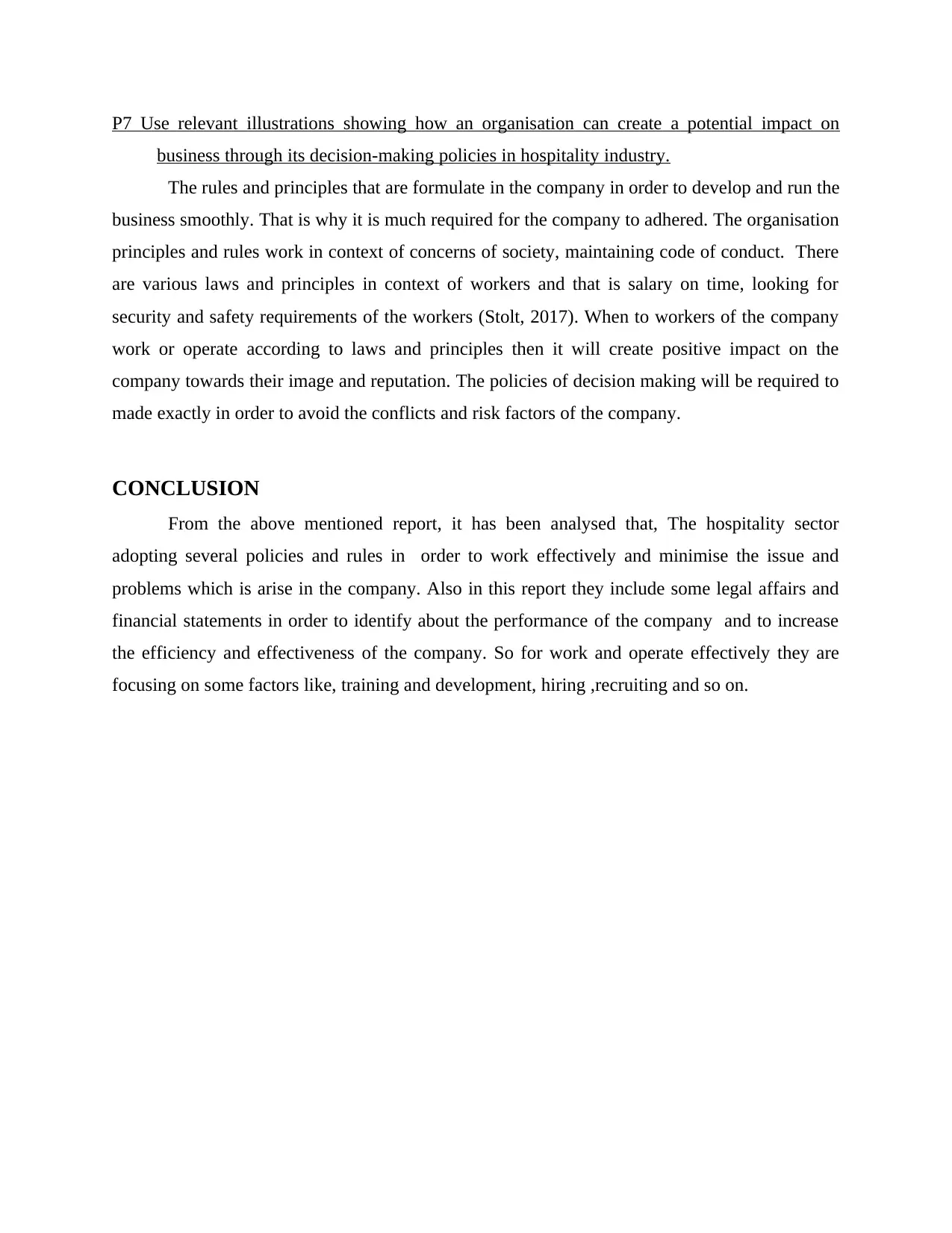
P7 Use relevant illustrations showing how an organisation can create a potential impact on
business through its decision-making policies in hospitality industry.
The rules and principles that are formulate in the company in order to develop and run the
business smoothly. That is why it is much required for the company to adhered. The organisation
principles and rules work in context of concerns of society, maintaining code of conduct. There
are various laws and principles in context of workers and that is salary on time, looking for
security and safety requirements of the workers (Stolt, 2017). When to workers of the company
work or operate according to laws and principles then it will create positive impact on the
company towards their image and reputation. The policies of decision making will be required to
made exactly in order to avoid the conflicts and risk factors of the company.
CONCLUSION
From the above mentioned report, it has been analysed that, The hospitality sector
adopting several policies and rules in order to work effectively and minimise the issue and
problems which is arise in the company. Also in this report they include some legal affairs and
financial statements in order to identify about the performance of the company and to increase
the efficiency and effectiveness of the company. So for work and operate effectively they are
focusing on some factors like, training and development, hiring ,recruiting and so on.
business through its decision-making policies in hospitality industry.
The rules and principles that are formulate in the company in order to develop and run the
business smoothly. That is why it is much required for the company to adhered. The organisation
principles and rules work in context of concerns of society, maintaining code of conduct. There
are various laws and principles in context of workers and that is salary on time, looking for
security and safety requirements of the workers (Stolt, 2017). When to workers of the company
work or operate according to laws and principles then it will create positive impact on the
company towards their image and reputation. The policies of decision making will be required to
made exactly in order to avoid the conflicts and risk factors of the company.
CONCLUSION
From the above mentioned report, it has been analysed that, The hospitality sector
adopting several policies and rules in order to work effectively and minimise the issue and
problems which is arise in the company. Also in this report they include some legal affairs and
financial statements in order to identify about the performance of the company and to increase
the efficiency and effectiveness of the company. So for work and operate effectively they are
focusing on some factors like, training and development, hiring ,recruiting and so on.
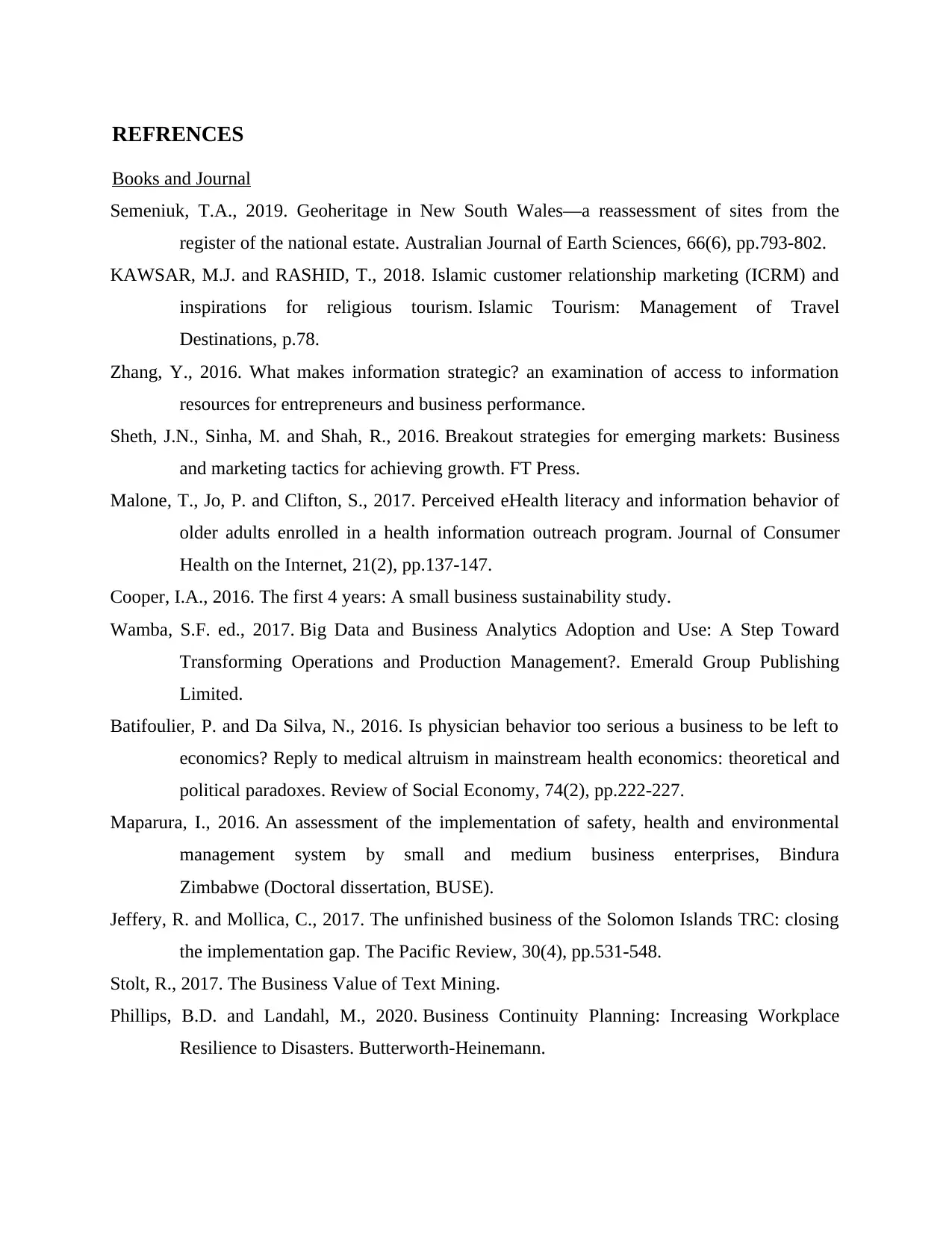
REFRENCES
Books and Journal
Semeniuk, T.A., 2019. Geoheritage in New South Wales—a reassessment of sites from the
register of the national estate. Australian Journal of Earth Sciences, 66(6), pp.793-802.
KAWSAR, M.J. and RASHID, T., 2018. Islamic customer relationship marketing (ICRM) and
inspirations for religious tourism. Islamic Tourism: Management of Travel
Destinations, p.78.
Zhang, Y., 2016. What makes information strategic? an examination of access to information
resources for entrepreneurs and business performance.
Sheth, J.N., Sinha, M. and Shah, R., 2016. Breakout strategies for emerging markets: Business
and marketing tactics for achieving growth. FT Press.
Malone, T., Jo, P. and Clifton, S., 2017. Perceived eHealth literacy and information behavior of
older adults enrolled in a health information outreach program. Journal of Consumer
Health on the Internet, 21(2), pp.137-147.
Cooper, I.A., 2016. The first 4 years: A small business sustainability study.
Wamba, S.F. ed., 2017. Big Data and Business Analytics Adoption and Use: A Step Toward
Transforming Operations and Production Management?. Emerald Group Publishing
Limited.
Batifoulier, P. and Da Silva, N., 2016. Is physician behavior too serious a business to be left to
economics? Reply to medical altruism in mainstream health economics: theoretical and
political paradoxes. Review of Social Economy, 74(2), pp.222-227.
Maparura, I., 2016. An assessment of the implementation of safety, health and environmental
management system by small and medium business enterprises, Bindura
Zimbabwe (Doctoral dissertation, BUSE).
Jeffery, R. and Mollica, C., 2017. The unfinished business of the Solomon Islands TRC: closing
the implementation gap. The Pacific Review, 30(4), pp.531-548.
Stolt, R., 2017. The Business Value of Text Mining.
Phillips, B.D. and Landahl, M., 2020. Business Continuity Planning: Increasing Workplace
Resilience to Disasters. Butterworth-Heinemann.
Books and Journal
Semeniuk, T.A., 2019. Geoheritage in New South Wales—a reassessment of sites from the
register of the national estate. Australian Journal of Earth Sciences, 66(6), pp.793-802.
KAWSAR, M.J. and RASHID, T., 2018. Islamic customer relationship marketing (ICRM) and
inspirations for religious tourism. Islamic Tourism: Management of Travel
Destinations, p.78.
Zhang, Y., 2016. What makes information strategic? an examination of access to information
resources for entrepreneurs and business performance.
Sheth, J.N., Sinha, M. and Shah, R., 2016. Breakout strategies for emerging markets: Business
and marketing tactics for achieving growth. FT Press.
Malone, T., Jo, P. and Clifton, S., 2017. Perceived eHealth literacy and information behavior of
older adults enrolled in a health information outreach program. Journal of Consumer
Health on the Internet, 21(2), pp.137-147.
Cooper, I.A., 2016. The first 4 years: A small business sustainability study.
Wamba, S.F. ed., 2017. Big Data and Business Analytics Adoption and Use: A Step Toward
Transforming Operations and Production Management?. Emerald Group Publishing
Limited.
Batifoulier, P. and Da Silva, N., 2016. Is physician behavior too serious a business to be left to
economics? Reply to medical altruism in mainstream health economics: theoretical and
political paradoxes. Review of Social Economy, 74(2), pp.222-227.
Maparura, I., 2016. An assessment of the implementation of safety, health and environmental
management system by small and medium business enterprises, Bindura
Zimbabwe (Doctoral dissertation, BUSE).
Jeffery, R. and Mollica, C., 2017. The unfinished business of the Solomon Islands TRC: closing
the implementation gap. The Pacific Review, 30(4), pp.531-548.
Stolt, R., 2017. The Business Value of Text Mining.
Phillips, B.D. and Landahl, M., 2020. Business Continuity Planning: Increasing Workplace
Resilience to Disasters. Butterworth-Heinemann.
⊘ This is a preview!⊘
Do you want full access?
Subscribe today to unlock all pages.

Trusted by 1+ million students worldwide
1 out of 13
Related Documents
Your All-in-One AI-Powered Toolkit for Academic Success.
+13062052269
info@desklib.com
Available 24*7 on WhatsApp / Email
![[object Object]](/_next/static/media/star-bottom.7253800d.svg)
Unlock your academic potential
Copyright © 2020–2026 A2Z Services. All Rights Reserved. Developed and managed by ZUCOL.





